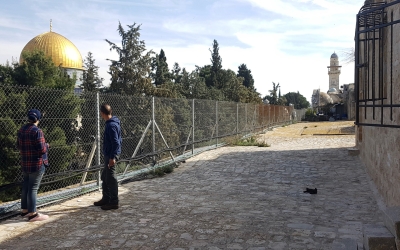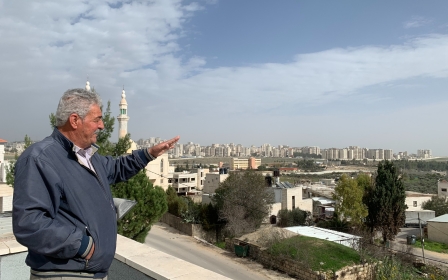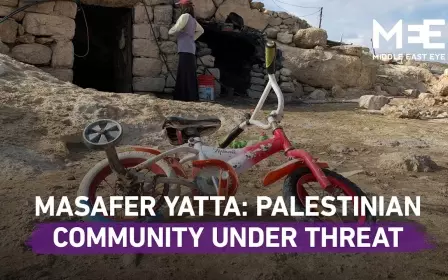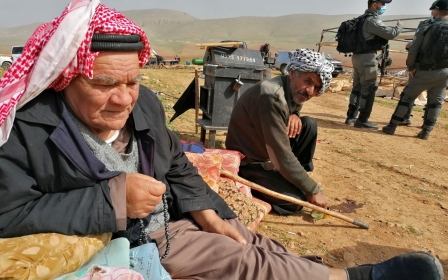'They destroyed our dreams': Israel’s bulldozers target Palestinian women farmers
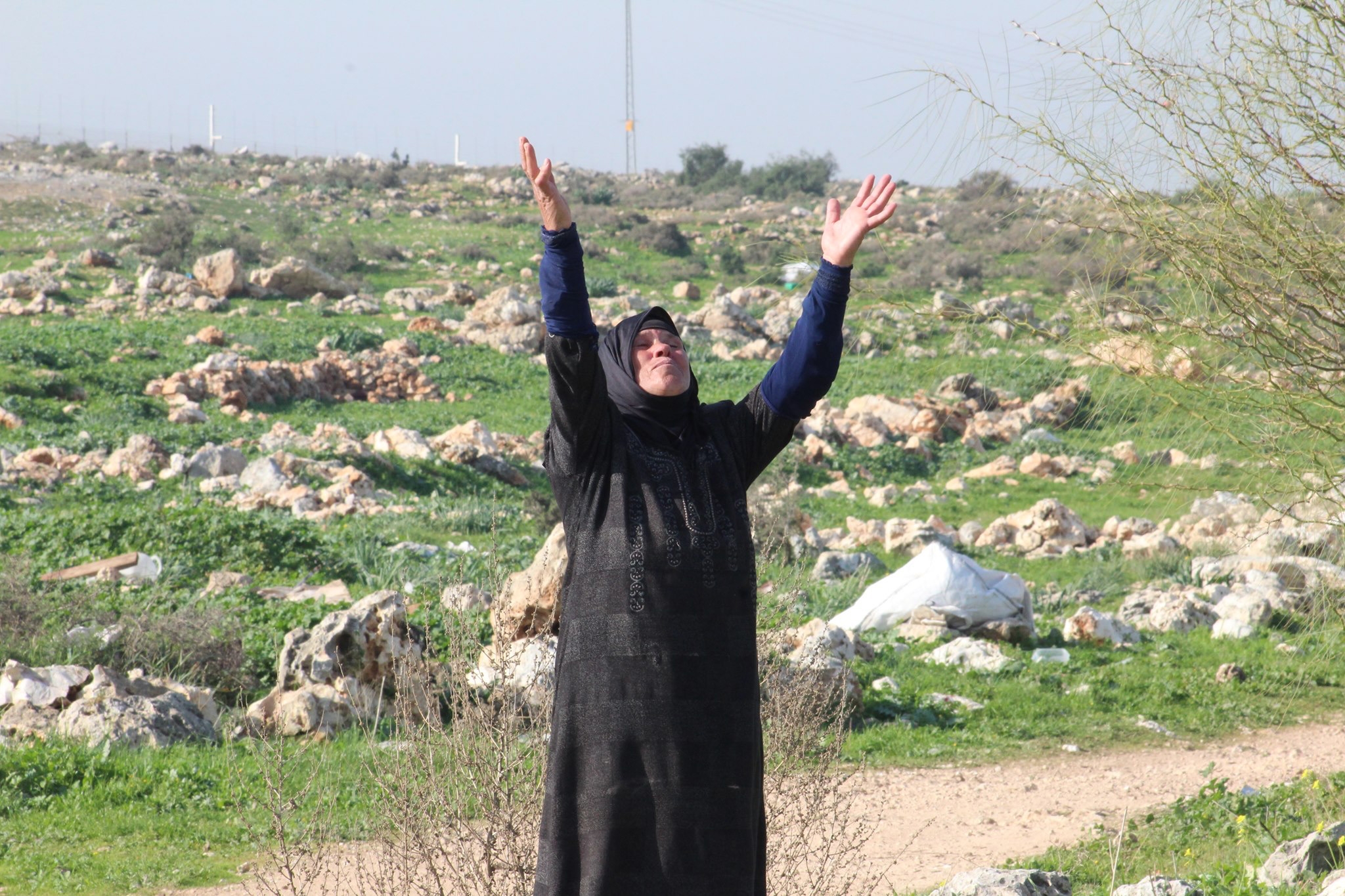
After a five-kilometre walk from her home in the northern occupied West Bank, 49-year-old Khitam Ismail arrived on her plot of land at six in the morning, a routine she has maintained for years, and began to work.
Her constant cries over the recent loss of her beloved olive trees, which she has spent more than a decade growing, can be heard in the area.
'I raised the trees as if they were my children'
- Khitam Ismail, farmer
On 6 December, Israeli bulldozers and dozens of army personnel raided the Khallet al-Abhar area in Deir Ballout, on the outskirts of the Palestinian city of Salfit, and carried out one of the largest tree uprooting operations to date in the West Bank, destroying 3,400 olive trees in one day.
According to officials in the local council, Israeli authorities also levelled hundreds of dunams of land with bulldozers in Area C, which residents fear comes in preparation for mass land confiscation in the village in the near future.
Four months earlier, in August 2020, the Israeli authorities issued a decision to confiscate the land under the pretext that it is “state land”. While landowners submitted a petition against the move accompanied with documents proving ownership, Israeli authorities carried out its decision before the Israeli judiciary made its final judgement.
Ismail had lost 750 olive trees in one day, but that did not deter her from returning to her land, and begin work from point zero.
A mother of three, Ismail told Middle East Eye that 15 years ago, she had rehabilitated about 35 dunams of her plot, planting it with olive trees.
“I did not receive a warning to stop farming or a land confiscation order during all those years. I put all I have in money and gold into this land,” she said.
"I raised the trees as if they were my children. Last year we were able to harvest and produce about ten tanks of olive oil.
“I was expecting to come out with 50 oil tanks this year, and that the land’s oil production would rise in the next five years to 400-500 oil tanks annually.”
Ismail's family has become dependent on this land, extending across around 550 dunams, as the main source of income. She had hoped that, through her land’s yield, she would be able to send her three children to college.
Destroying dreams
“In just five hours, they destroyed all the hard work we exerted over the past few years,” she said, describing the day of 6 December when the Israeli army razed parts of her land.
“They were not content with just that, they even confiscated the trees after they uprooted them, and some were chopped up and sprayed with chemical material to kill them.”
She estimates that her losses amount to about 300,000 shekel. In addition to her olive trees, the Israeli army also destroyed 40 of Ismail's almond trees, 40 fig trees and 30 grapevines. Areas growing with thyme and sage were also razed.
“I would rather be dead than see this happen to my land. I have insomnia and I don’t get more than three hours of sleep a night,” she said.
“Whenever I wake up, I imagine this to be a nightmare that I will wake up from,” she said. “They destroyed us. They destroyed all our dreams and aspirations.”
Ismail is one of many Palestinian women in Deir Ballout whose livelihood is being damaged by Israeli settler expansion. The village depends largely on agriculture for income, and on the key role that women play in running these operations at all levels - from farming to harvesting the crops. Most men in the village work in construction and many work in Israel, so it’s the women who primarily take care of the land.
Deir Ballout is termed locally as the Salfit governorate’s “food basket”. In the month of May, dozens of women can be seen working on the large plains lining the entrance of the village, about 1,000 dunam in size, harvesting faqqous, a popular and local cucumber-like vegetable, for which the village is renowned.
According to Amna Fayez, head of the Deir Ballout-based Ibdaa cooperative association for women’s agricultural production, about 450 women make up 90 percent of the agricultural workforce.
Fayez told MEE that the village plains have recently come under threat of confiscation and have been impacted by sewage water flowing from nearby settlements.
Strategic importance
Aisha Abdullah, 52, is another woman whose 300 olive trees, planted across 20 dunams of land, were destroyed on 6 December by Israeli bulldozers in Deir Ballout.
“We started gradually cultivating the land 12 years ago. My husband, children and I worked daily on our land, planting trees and taking care of the land so that we could harvest the crops,” she said.
'[Women] have come to feel a direct threat is surrounding them. They are on their plots of land for long hours, guarding them'
- Amna Fayez, head of Ibdaa
Yahya Odeh, head of the Deir Ballout local council, explained to MEE that the village is located in an area considered to be strategic, and consequently under constant threat by Israel. While it is situated in the occupied West Bank, Deir Ballout lies only six kilometres away from Lod Airport, and straddles the 1967 armistice lines.
“The village spanned 36,000 dunams in size in 1948. Today, there are 11,000 dunams left, 95 percent of which is classified as Area C, where there are also 400 homes at risk of demolition,” said Odeh.
The town’s master plan only accounts for 740 dunam of an already built-up area, he noted.
Fayez highlighted that with the recent developments, Israeli authorities are directly targeting and impacting the women of Deir Ballout, their livelihoods, income and families, by confiscating Palestinian land and expanding settlements.
She said that they live in a constant state of fear of losing their lands and have been showing reluctance to plant crops that may suddenly be destroyed by Israeli machinery at any time, and without prior warning.
According to the Union of Agricultural Work Committees, a Palestinian NGO that supports and sustains farmers, the Israeli army and settlers uprooted over 15,300 Palestinian-owned olive, almond and forest trees across various areas of the West Bank in January alone, while the army approved the confiscation of about 1,000 dunams.
"The women have suffered a great deal of psychological trauma. They have come to feel a direct threat is surrounding them,” said Fayez.
“They are on their plots of land for long hours, guarding them."
Middle East Eye propose une couverture et une analyse indépendantes et incomparables du Moyen-Orient, de l’Afrique du Nord et d’autres régions du monde. Pour en savoir plus sur la reprise de ce contenu et les frais qui s’appliquent, veuillez remplir ce formulaire [en anglais]. Pour en savoir plus sur MEE, cliquez ici [en anglais].


